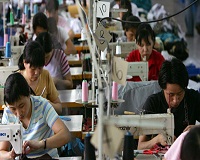"While the trade truce between the US and China gave brands and retailers some time to plan their counteractions if President Trump levies tariffs on the remaining goods imported from China, it also extended the uncertainty over the future. Every time a new set of tariffs are announced, soft goods brands and retailers anxiously wait to hear the fate of their products. Though apparel and footwear have been primarily been left thus far, the next round of tariffs are surely likely to include these goods."
 While the trade truce between the US and China gave brands and retailers some time to plan their counteractions if President Trump levies tariffs on the remaining goods imported from China, it also extended the uncertainty over the future. Every time a new set of tariffs are announced, soft goods brands and retailers anxiously wait to hear the fate of their products. Though apparel and footwear have been primarily been left thus far, the next round of tariffs are surely likely to include these goods.
While the trade truce between the US and China gave brands and retailers some time to plan their counteractions if President Trump levies tariffs on the remaining goods imported from China, it also extended the uncertainty over the future. Every time a new set of tariffs are announced, soft goods brands and retailers anxiously wait to hear the fate of their products. Though apparel and footwear have been primarily been left thus far, the next round of tariffs are surely likely to include these goods.
If these tariffs are indeed levied, the trade war will cost $915 per person in 2019 or $2,357 per household, as per a new ImpactEcon report. It will also result in lower wages and higher joblessness. The trade war, according to the authors of the report, Terrie Walmsley and Peter Minor is likely to benefit all countries, except the US and China.
Search for new options as China’s production drops
Two countries that might benefit the most from trade war are: Vietnam and Cambodia as brands like Vera Bradley might increase production there to reduce exposure to the volatility in China.
Production in China is expected to drop from 57 per cent this year to 25 per cent in 2019. Companies are searching for new  options with Abercrombie & Fitch even prepared to leverage sourcing partners in any of the 17 countries. The mall-based retailer currently imports 25 per cent of its goods from China. It has already reduced production in China from more than 50 per cent to 40 per cent or lower.
options with Abercrombie & Fitch even prepared to leverage sourcing partners in any of the 17 countries. The mall-based retailer currently imports 25 per cent of its goods from China. It has already reduced production in China from more than 50 per cent to 40 per cent or lower.
Tariffs to increase import costs
Currently, 40 per cent of US apparel and 70 per cent of footwear is imported from China. If the tariffs are implemented, import costs for goods produced in China will increase. This, according to Steve Lamar, Executive Vice President, will result in higher prices for consumers.
Lamar estimates 25 per cent tariff would result in a 15 to 25 per cent increase in retail prices over time, which would cost shoppers $500 for a family of four. Already, brands like Carter’s believe the tariffs would translate into price increases. If these tariffs are implemented, the company plans to shift their operations to Vietnam, Bangladesh and Indonesia.
GIII Apparel Group, which has brands like Calvin Klein, DKNY, Kensie, Tommy Hilfiger and Karl Lagerfeld Paris in its portfolio, is already dealing with price pressure due to tariffs. The pressure has affected its handbags and leather outerwear business, which represents approximately 7 per cent of its total net sales. In response, the group plans to diversify out of China. The company’s partners in China have offered to help the company recoup lost margins. And, some retailers have agreed to share in the increases that we might impose on pricing.
However, Manny Chirico, CEO and Chairman of PVC Corp believes if apparel and footwear tariffs materialise, prices will increase irrespective of where companies shift production.












